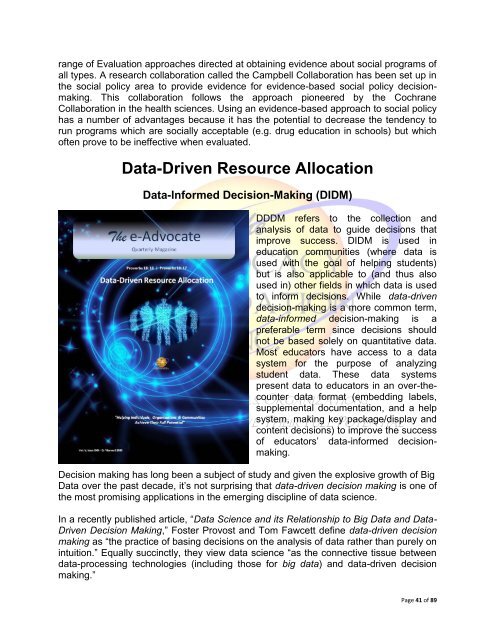The Nonprofit Incubator
The Nonprofit Incubator
The Nonprofit Incubator
You also want an ePaper? Increase the reach of your titles
YUMPU automatically turns print PDFs into web optimized ePapers that Google loves.
ange of Evaluation approaches directed at obtaining evidence about social programs of<br />
all types. A research collaboration called the Campbell Collaboration has been set up in<br />
the social policy area to provide evidence for evidence-based social policy decisionmaking.<br />
This collaboration follows the approach pioneered by the Cochrane<br />
Collaboration in the health sciences. Using an evidence-based approach to social policy<br />
has a number of advantages because it has the potential to decrease the tendency to<br />
run programs which are socially acceptable (e.g. drug education in schools) but which<br />
often prove to be ineffective when evaluated.<br />
Data-Driven Resource Allocation<br />
Data-Informed Decision-Making (DIDM)<br />
DDDM refers to the collection and<br />
analysis of data to guide decisions that<br />
improve success. DIDM is used in<br />
education communities (where data is<br />
used with the goal of helping students)<br />
but is also applicable to (and thus also<br />
used in) other fields in which data is used<br />
to inform decisions. While data-driven<br />
decision-making is a more common term,<br />
data-informed decision-making is a<br />
preferable term since decisions should<br />
not be based solely on quantitative data.<br />
Most educators have access to a data<br />
system for the purpose of analyzing<br />
student data. <strong>The</strong>se data systems<br />
present data to educators in an over-thecounter<br />
data format (embedding labels,<br />
supplemental documentation, and a help<br />
system, making key package/display and<br />
content decisions) to improve the success<br />
of educators’ data-informed decisionmaking.<br />
Decision making has long been a subject of study and given the explosive growth of Big<br />
Data over the past decade, it’s not surprising that data-driven decision making is one of<br />
the most promising applications in the emerging discipline of data science.<br />
In a recently published article, “Data Science and its Relationship to Big Data and Data-<br />
Driven Decision Making,” Foster Provost and Tom Fawcett define data-driven decision<br />
making as “the practice of basing decisions on the analysis of data rather than purely on<br />
intuition.” Equally succinctly, they view data science “as the connective tissue between<br />
data-processing technologies (including those for big data) and data-driven decision<br />
making.”<br />
Page 41 of 89

















